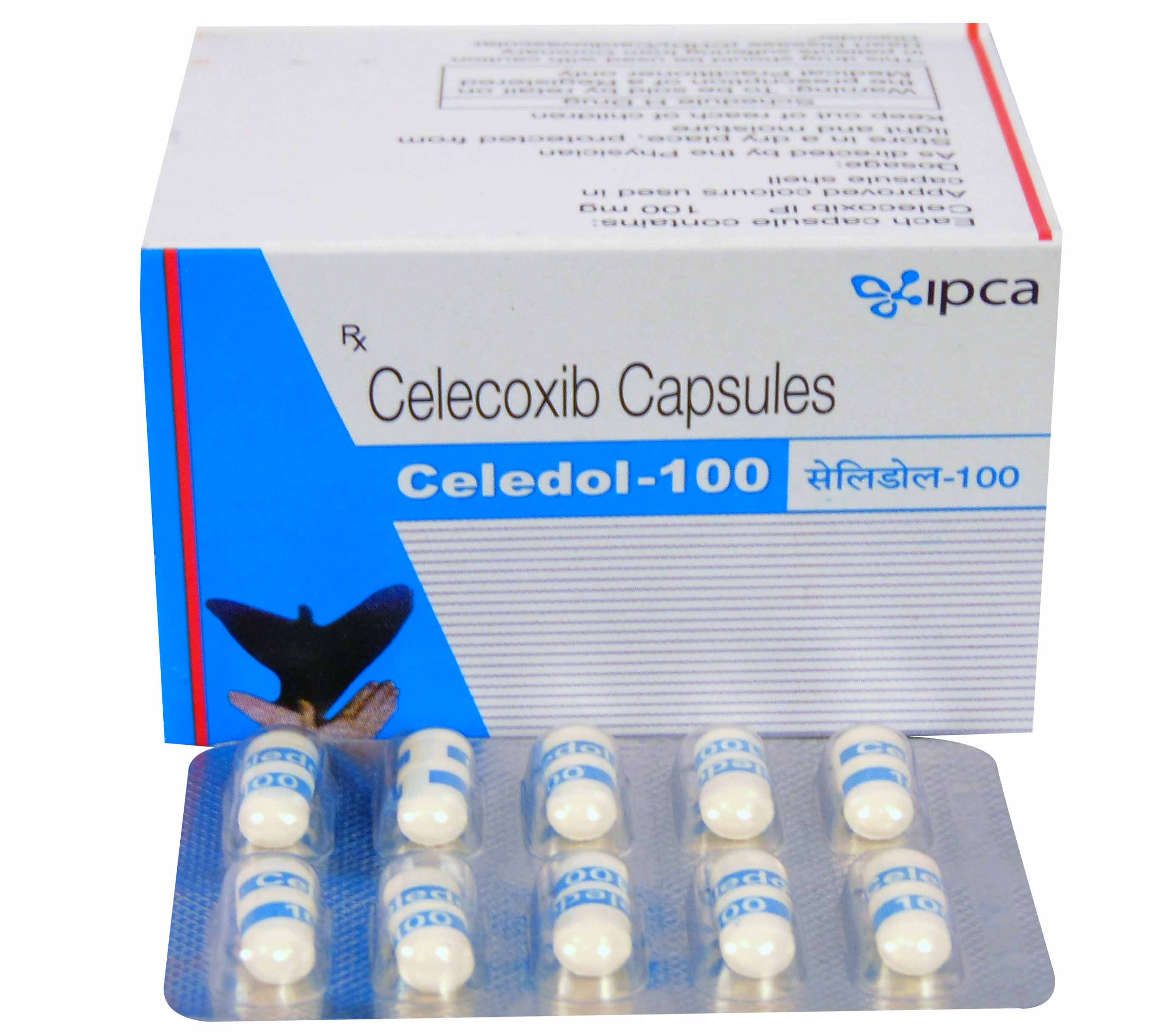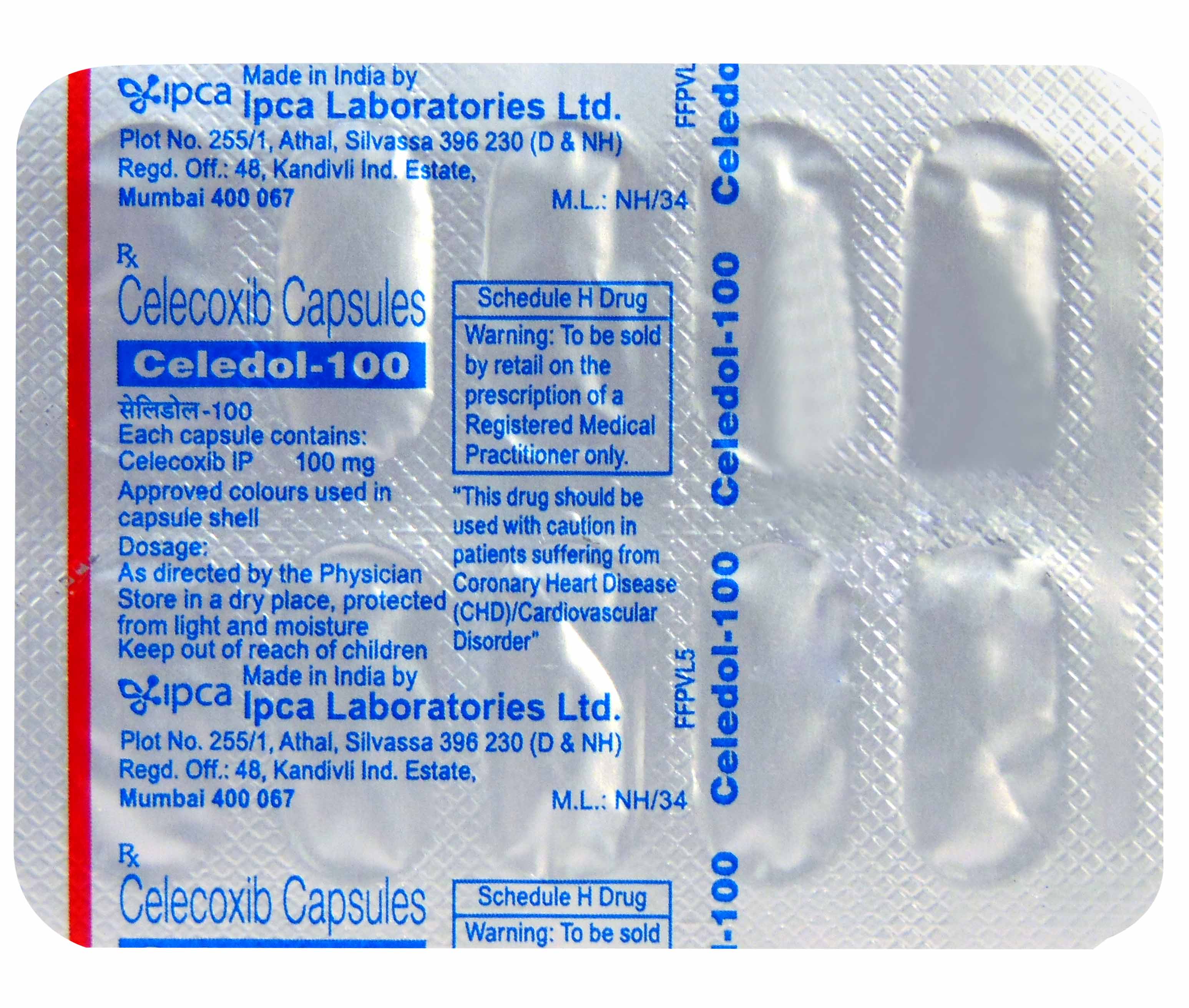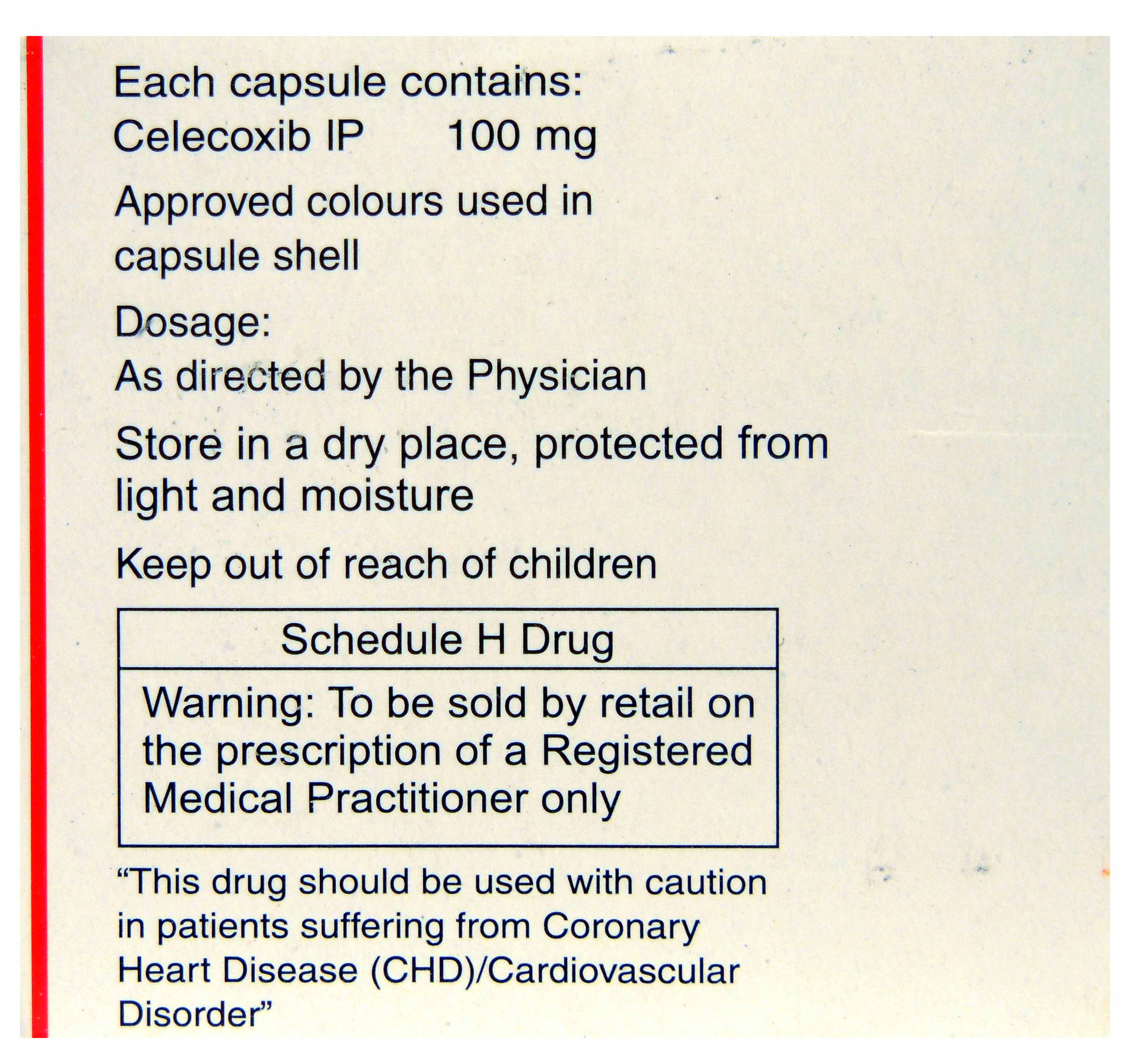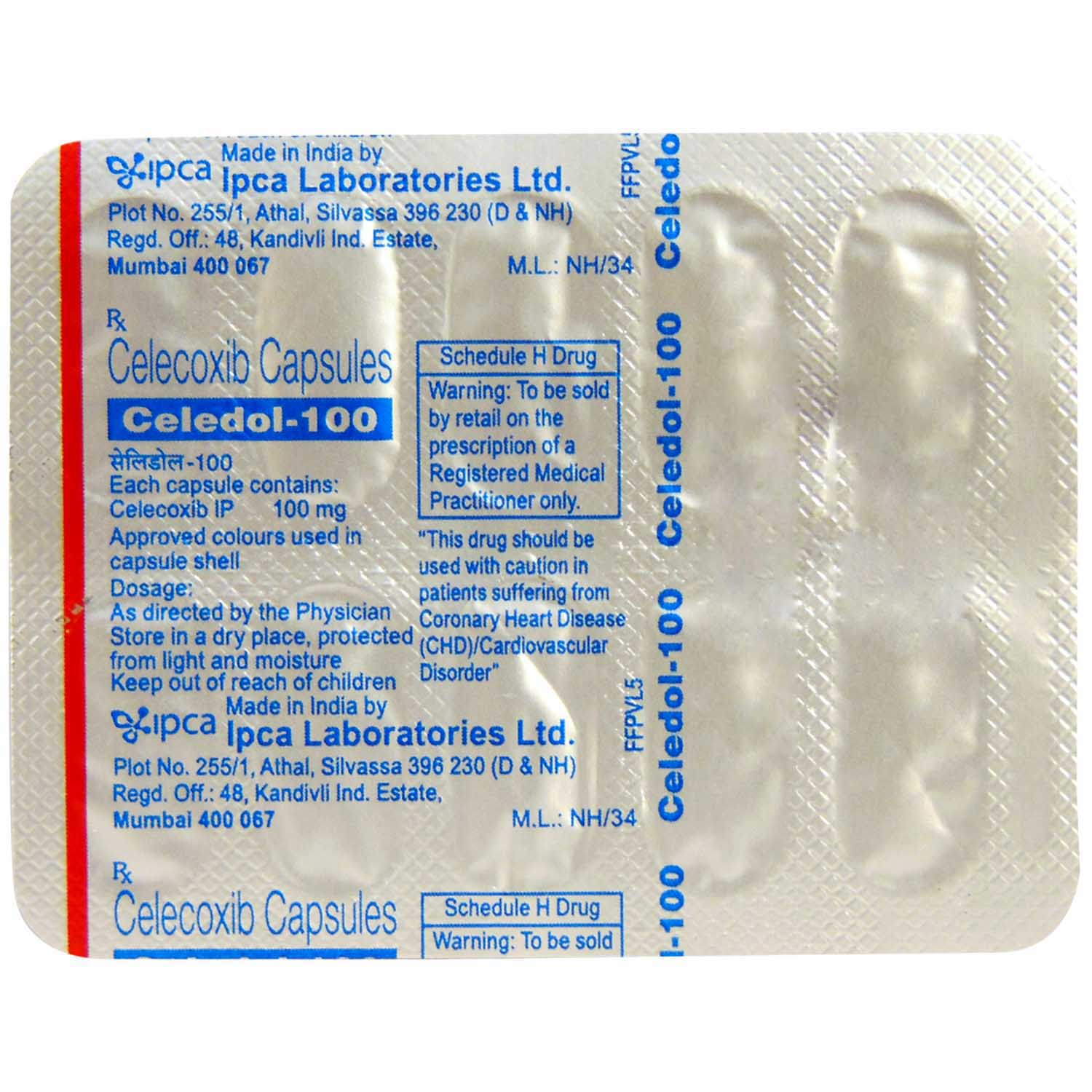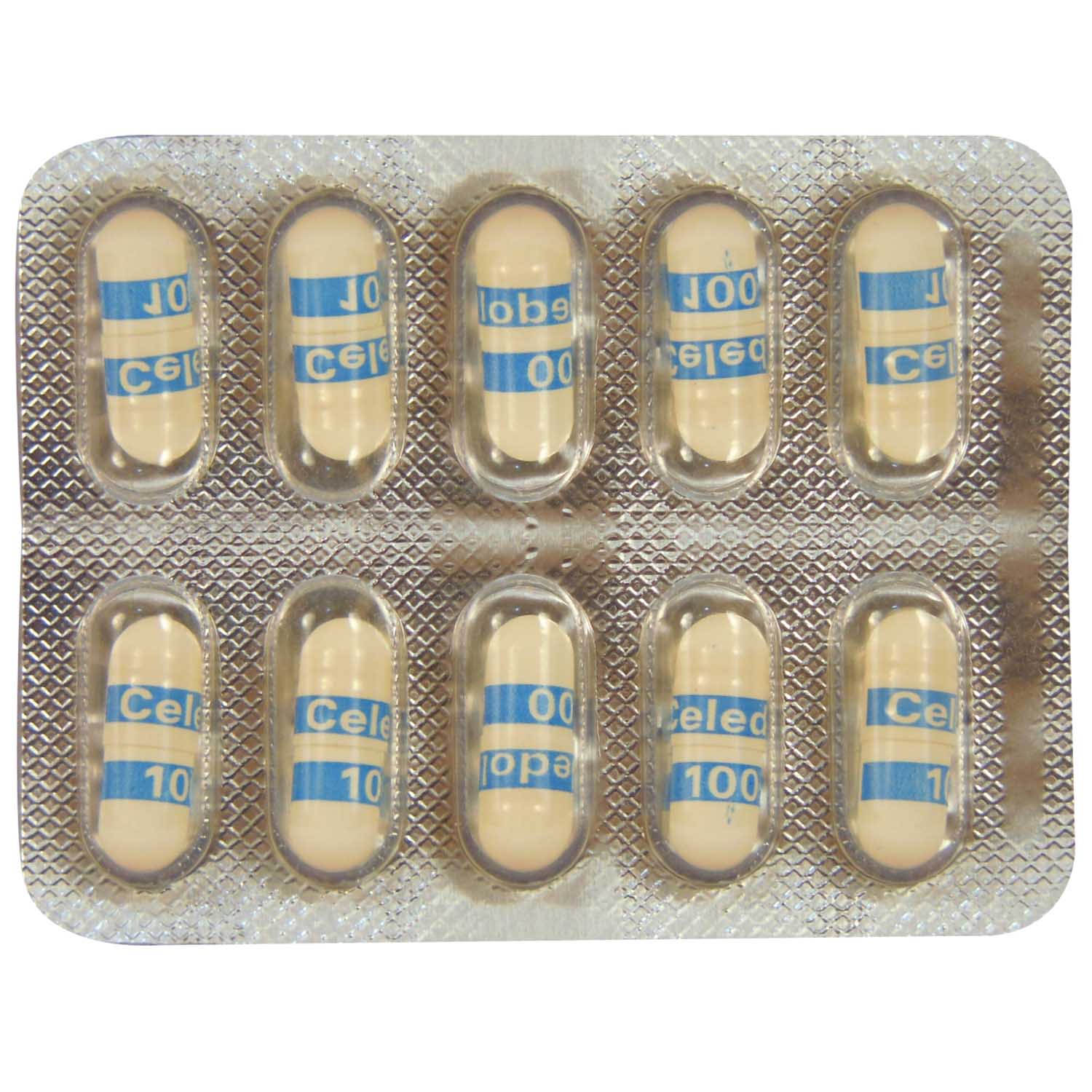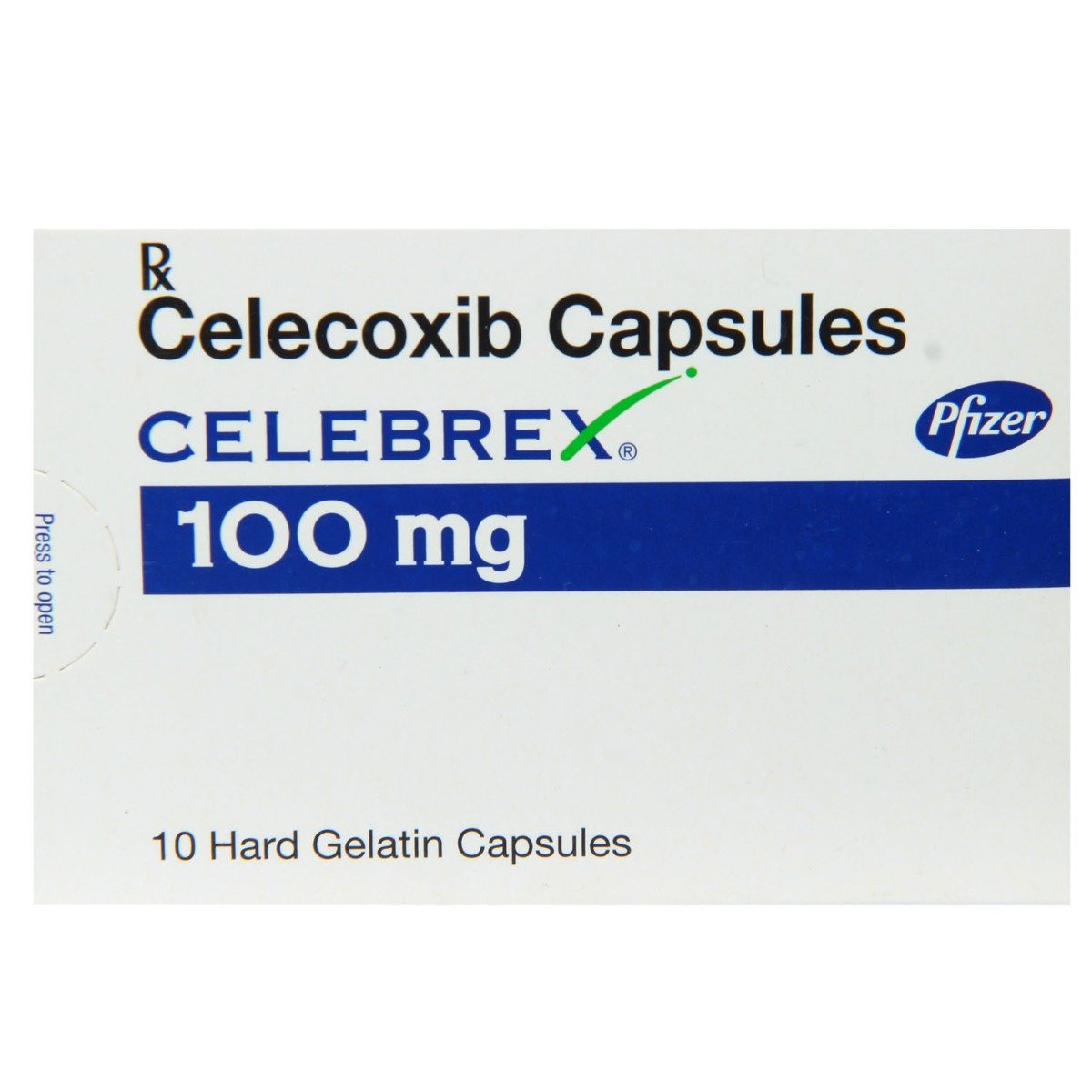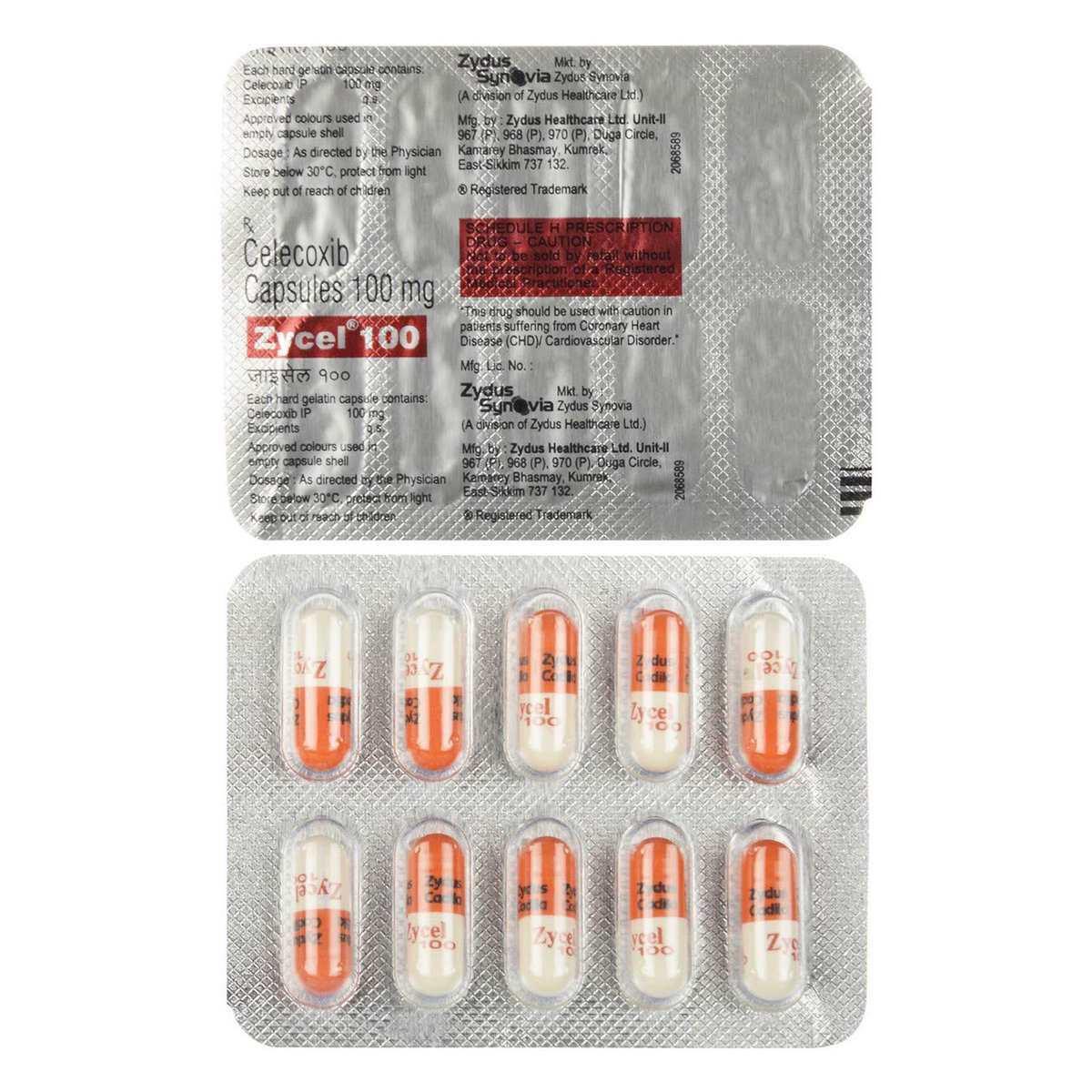CELEDOL 100MG CAPSULE
MRP ₹42.85
(Inclusive of all Taxes)
₹6.4 Cashback (15%)
Provide Delivery Location
Online payment accepted
 Prescription drug
Prescription drugWhats That
Composition :
Manufacturer/Marketer :
Consume Type :
Expires on or after :
Return Policy :
About CELEDOL 100MG CAPSULE
CELEDOL 100MG CAPSULE contains 'pain killers,' primarily used to reduce pain and swelling in muscles and joints. It treats painful conditions of osteoarthritis, rheumatoid arthritis, ankylosing spondylitis (pain and stiffness in the backbone), cervical spondylitis (wear and tear of spinal discs in neck), and menstrual pain. Arthritis is a condition that causes swelling of one or more joints resulting in pain and stiffness of joints that worsen over time.
CELEDOL 100MG CAPSULE contains Celecoxib, which works by blocking cyclo-oxygenase (COX) enzyme, responsible for causing pain and inflammation in the body. Thereby, it helps relieve pain and swelling associated with different types of arthritis, spondylitis, low back pain, and menstrual pain.
Your doctor will advise you on how often you take this medicine based on your medical condition. In some cases, you may experience indigestion, stomach pain, diarrhoea, oedema, and flatulence. Most of these side effects of CELEDOL 100MG CAPSULE do not require medical attention and gradually resolve over time. However, if the side effects persist or worsen, please consult your doctor.
If you are known to be allergic to CELEDOL 100MG CAPSULE or any other medicines, please tell your doctor. If you are pregnant or breastfeeding, please inform your doctor before taking CELEDOL 100MG CAPSULE. Do not consume alcohol with CELEDOL 100MG CAPSULE as it may increase the risk of stomach bleeding. CELEDOL 100MG CAPSULE may cause an increased risk of severe heart problems like myocardial infarction and stroke, which can be fatal. It should not be used by a patient who has undergone recent heart bypass surgery or will have it. CELEDOL 100MG CAPSULE increases the risk of severe gastrointestinal conditions like bleeding, ulceration, and perforation of the stomach or intestines, which can be fatal.
Uses of CELEDOL 100MG CAPSULE
Directions for Use
Key Benefits
CELEDOL 100MG CAPSULE contains 'pain killers' primarily used to reduce pain and swelling in muscles and joints in conditions such as osteoarthritis, rheumatoid arthritis, ankylosing spondylitis (pain and stiffness in the backbone), cervical spondylitis (wear and tear of spinal discs in neck), menstrual pain. It contains Celecoxib, which works by blocking the action of cyclo-oxygenase (COX) enzyme in the body involved in producing certain chemical substances such as prostaglandins that cause pain and swelling. Thereby, it helps in relieving pain and swelling associated with different types of arthritis.
Storage
- Drink water or other clear fluids.
- To prevent worsening of pain, limit intake of tea, coffee, or alcohol.
- Include bland foods like rice, toast, crackers, and rice in your diet.
- Avoid lying down immediately after eating as it may cause indigestion or heartburn.
- Avoid acidic and spicy food as it may cause indigestion.
- Wear compression garments like stockings, sleeves, or gloves to apply pressure and help stop fluid from building up, especially after the swelling goes down.
- Move around and do exercises to help the fluid circulate, especially in swollen limbs. Ask your doctor for specific exercises.
- Raise the swollen area above your heart level several times a day, even while sleeping, to help reduce swelling.
- Gently massage the swollen area with firm but not painful pressure.
- Keep the swollen area clean and moisturized to prevent injury and infection.
- Reduce salt intake to help prevent fluid from building up and worsening the swelling, as advised by a doctor.
- If the swelling does not get better after a few days of home treatment or worsens, consult your doctor right away.
- Skin rash caused by allergies is due to irritants or allergens. Therefore, avoid contact with such irritants.
- Consult your doctor for proper medication and apply an anti-itch medication. Follow the schedule and use the medication whenever needed.
- Protect your skin from extreme heat and try to apply wet compresses.
- Soak in the cool bath, which gives a soothing impact to the affected area.
- Drink warm fluids such as warm water with honey, broth, soup or herbal tea to soothe sore throat.
- Gargle with warm salt water.
- Suck on lozenges to increase the production of saliva and soothe your throat.
- Use a humidifier to soothe sore throat as it adds moisture to the air and makes breathing easier.
- Inform Your Doctor: Notify your doctor immediately about your diarrhoea symptoms. This allows them to adjust your medication or provide guidance on managing side effects.
- Stay Hydrated: Drink plenty of fluids to replace lost water and electrolytes. Choose water, clear broth, and electrolyte-rich drinks. Avoid carbonated or caffeinated beverages to effectively rehydrate your body.
- Follow a Bland Diet: Eat easy-to-digest foods to help firm up your stool and settle your stomach. Try incorporating bananas, rice, applesauce, toast, plain crackers, and boiled vegetables into your diet.
- Avoid Trigger Foods: Steer clear of foods that can worsen diarrhoea, such as spicy, fatty, or greasy foods, high-fibre foods, and dairy products (especially if you're lactose intolerant).
- Practice Good Hygiene: Maintain good hygiene to prevent the spread of infection. To stay healthy, wash your hands frequently, clean and disinfect surfaces regularly, and avoid exchanging personal belongings with others.
- Take Anti-Diarrheal Medications: If your doctor advises, anti-diarrheal medications such as loperamide might help manage diarrhoea symptoms. Always follow your doctor's directions.
- Keep track of your diarrhoea symptoms. If they don't get better or worse or are accompanied by severe stomach pain, blood, or dehydration signs (like extreme thirst or dark urine), seek medical help.
- Take medications with food (if recommended): It can help prevent stomach distress and indigestion.
- Eat smaller, more frequent meals: Divide daily food intake into smaller, more frequent meals to ease digestion.
- Avoid trigger foods: Identify and avoid foods that trigger indigestion, such as spicy, fatty, or acidic foods.
- Stay upright after eating: Sit or stand upright for at least 1-2 hours after eating to prevent stomach acid from flowing into the oesophagus.
- Avoid carbonated drinks: Avoid drinking carbonated beverages, such as soda or beer, which can worsen indigestion.
- Manage stress: To alleviate indigestion, engage in stress-reducing activities like deep breathing exercises or meditation.
- Consult a doctor if needed: If indigestion worsens or persists, consult a healthcare professional to adjust the medication regimen or explore alternative treatments.
- Tell your doctor about your GAS symptoms. They may change your medication regimen or prescribe additional drugs to help you manage them.
- To manage GAS symptoms, eat a balanced diet of fibre, vegetables, and fruits.
- Drink enough water throughout the day to avoid constipation and treat GAS symptoms.
- Regular exercise like yoga and walking may help stimulate digestion and alleviate GAS symptoms.
- Take probiotics only if your doctor advises, as they may help alleviate GAS symptoms by promoting gut health.
- Take medication for GAS symptoms only if your doctor advises, as certain medications can interact with your existing prescriptions or worsen symptoms.
- If symptoms persist, worsen, or are accompanied by severe abdominal pain, vomiting, or bleeding, seek immediate medical attention.
Drug Warnings
Do not take CELEDOL 100MG CAPSULE if you are allergic to any of its ingredients. CELEDOL 100MG CAPSULE may cause an increased risk of severe heart problems like myocardial infarction and stroke, which can be fatal. It should not be used by the patient who has had undergone recent heart bypass surgery or will have it. CELEDOL 100MG CAPSULE increases the risk of severe gastrointestinal conditions like bleeding, ulceration and perforation of the stomach or intestines, which can be fatal. Elderly patients are at greater risk for gastrointestinal bleeding problems so that the doctor can limit their dose. CELEDOL 100MG CAPSULE is not recommended for pregnant women, especially in the third trimester as it may cause harm the unborn baby (fetus). Therefore, pregnant or breastfeeding women are advised to consult a doctor before taking CELEDOL 100MG CAPSULE. Do not consume alcohol with CELEDOL 100MG CAPSULE as it may increase the risk of stomach bleeding or ulcer. If you experience weight loss, diarrhoea, pain or vomiting, please stop taking CELEDOL 100MG CAPSULE and consult a doctor immediately. These might be signs of worsening or Crohn’s disease or ulcerative colitis (swelling in the digestive tract).
Drug-Drug Interactions
Drug-Drug Interactions
Login/Sign Up
Taking Ketorolac with Celedol 100mg Capsule can increase the risk of side effects such as gastrointestinal bleeding and ulcers.
How to manage the interaction:
Taking Celedol 100mg Capsule with Ketorolac is not recommended, but can be taken together if prescribed by a doctor. However, if you experience unusual bleeding or bruising, dizziness, lightheadedness, red or black, tarry stools, coughing up or vomiting fresh or dried blood that looks like coffee grounds, severe headache, and weakness. Do not discontinue any medications without consulting a doctor.
Co-administration of Celedol 100mg Capsule with Meloxicam can increase the risk or severity of bleeding and ulcers of the stomach lining leading to serious blood loss.
How to manage the interaction:
Taking Meloxicam with Celedol 100mg Capsule is not recommended, but can be taken together if prescribed by a doctor. However, consult the doctor if you experience any unusual symptoms. Do not discontinue any medications without consulting a dcovct
Taking eliglustat with Celedol 100mg Capsule can significantly increase the blood levels of eliglustat. This may increase the risk of serious side effects.
How to manage the interaction:
Taking Celedol 100mg Capsule with Eliglustat is not recommended, but can be taken together if prescribed by a doctor. However, consult the doctor if you experience sudden dizziness, lightheadedness, fainting, shortness of breath, slow heart rate and weak pulse. Do not discontinue any medications without consulting a doctor.
Taking thioridazine and Celedol 100mg Capsule may increases the blood levels of thioridazine which may cause irregular heart rhythm.
How to manage the interaction:
Taking Celedol 100mg Capsule with Thioridazine is not recommended, but it can be taken together if prescribed by a doctor. However, consult a doctor if you experience sudden dizziness, lightheadedness, fainting, shortness of breath. Do not stop using any medications without first talking to your doctor.
Co-administration of Cidofovir with Celedol 100mg Capsule can increase the risk of kidney problems.
How to manage the interaction:
Taking Celedol 100mg Capsule with Cidofovir is not recommended, please consult your doctor before taking it. However, consult the doctor if you experience nausea, vomiting, loss of appetite, increased or decreased urination, sudden weight gain or weight loss, fluid retention, swelling, shortness of breath, bone pain, muscle cramps, tiredness, weakness, dizziness, confusion, and irregular heart rhythm. Do not stop using any medications without talking to a doctor.
Taking Ketorolac with Celedol 100mg Capsule can increase the risk of gastrointestinal bleeding and ulcers,
How to manage the interaction:
Taking Ketorolac tromethamine with Celedol 100mg Capsule is not recommended, but can be taken together if prescribed by a doctor. However, consult a doctor if you experience dizziness, lightheadedness, red or black, tarry stools, coughing up or vomiting fresh or dried blood that looks like coffee grounds, severe headache and weakness. Do not stop using any medications without first talking to your doctor.
Taking everolimus with Celedol 100mg Capsule may increase risk of kidney problems.
How to manage the interaction:
There may be a possibility of interaction between Everolimus and Celedol 100mg Capsule, but it can be taken if prescribed by a doctor. However, if you experience nausea, vomiting, loss of appetite, weight loss, swelling, muscle cramps, weakness, dizziness, confusion, or an irregular heartbeat, consult a doctor immediately. Do not discontinue any medications without consulting a doctor.
Taking Celedol 100mg Capsule with ioversol may increase the risk of kidney problems.
How to manage the interaction:
Although there is a interaction between Celedol 100mg Capsule and Ioversol, but it can be taken together if prescribed by your doctor. However, consult your doctor immediately if you experience symptoms such as such as nausea, vomiting, loss of hunger, increased or decreased urination, fluid retention, swelling of hands and legs, shortness of breath, muscle cramps, tiredness, weakness, dizziness, confusion, and irregular heart rhythm. Do not stop using any medications without a doctor's advice.
Taking Celedol 100mg Capsule with human immunoglobulin may increase risk of kidney problems.
How to manage the interaction:
Although taking Celedol 100mg Capsule and human immunoglobulin together can result in an interaction, it can be taken if a doctor has prescribed it. However, consult the doctor immediately if you experience symptoms such as nausea, vomiting, loss of hunger, increased or decreased urination, sudden weight gain or weight loss, fluid retention, swelling, shortness of breath, muscle cramps, tiredness, weakness, dizziness, confusion, and irregular heart rhythm. Do not discontinue any medications without consulting a doctor.
Coadministration of Celedol 100mg Capsule and Diclofenac Diethylamine can increase the risk of stomach inflammation.
How to manage the interaction:
Co-administration of Celedol 100mg Capsule and Diclofenac Diethylamine can lead to an interaction, it can be taken if your doctor advises. However, consult your doctor if you experience any stomach pain, vomiting, or dark stools. Do not stop using any medications without a doctor's advice.
Drug-Food Interactions
Drug-Food Interactions
Login/Sign Up
Diet & Lifestyle Advise
- Include more glucosamine, chondroitin sulfate, vitamin D, calcium-enriched supplements. Besides this, turmeric and fish oils can help in reducing inflammation in the tissue.
- Do not go for heavy exercise as it may increase your joint pain in arthritis. Instead, you can do stretching, low impact aerobic exercise like walking on a treadmill, bike riding and swimming. You can also strengthen your muscle strength by lifting light weights.
- In the chronic conditions of arthritis or joint pain, try to include fish like salmon, trout, tuna and sardines. These fishes are enriched with omega-3 fatty acids that minimize the level of a chemical called cytokines, which ramp up inflammation.
- Your sitting posture is important, especially when you have pain and inflammation conditions. Try to sit little as possible, and only for a short time (10-15 min). Use back support like a rolled-up towel at the back of your curve to minimize pain. Keep your knees and hips at a right angle. Besides this, you can use a footrest if required.
Side Effects of CELEDOL 100MG CAPSULE
- Indigestion
- Stomach pain
- Diarrhea
- Edema
- Flatulence
- Constipation
- Headache
Habit Forming
Therapeutic Class
All Substitutes & Brand Comparisons
RX
Out of StockCelcox 100mg Capsule
Lupin Ltd
₹26.5
(₹2.39 per unit)
38% CHEAPERRX
Out of StockCelira 100mg Capsule
Shreya Life Sciences Pvt Ltd
₹30
(₹2.7 per unit)
30% CHEAPERRX
Out of StockIcel 100mg Capsule
Zydus Cadila
₹40
(₹3.6 per unit)
6% CHEAPER
Drug-Diseases Interactions
Drug-Diseases Interactions
Login/Sign Up
FAQs
Drug-Drug Interactions Checker List
- IBUPROFEN
- DICLOFENAC
- PARACETAMOL
- ASPIRIN
- PROPRANOLOL
- ENALAPRIL
- LOSARTAN
- CANDESARTAN
- FUROSEMIDE
- HEPARIN
- WARFARIN
- CLOPIDOGREL
- PHENYTOIN
- GLIMEPIRIDE
- GLIPIZIDE
- MOXIFLOXACIN
- CIPROFLOXACIN
- ZIDOVUDINE
- CYCLOSPORINE
Special Advise
- If you are elderly, a smoker, had a stroke previously, or have high blood pressure, diabetes or high cholesterol, please inform your doctor as these conditions may increase the risk of heart problems.
- Regular monitoring of blood pressure as CELEDOL 100MG CAPSULE may reduce the blood pressure-lowering effects of certain blood pressure drugs.
- CELEDOL 100MG CAPSULE may cause anemia, monitor hemoglobin or hematorcrit in long term treatments.
- Do not take more than the prescribed dose as it may cause CELEDOL 100MG CAPSULE overdose and lead to symptoms such as heartburn, stomach upset, unconsciousness, dizziness, ringing or buzzing in ears, fits, fainting, diarrhea or excitation.
Disease/Condition Glossary
Arthritis: It is a condition that causes swelling of one or more joints resulting in pain and stiffness of joints that worsen over time. There are different types of arthritis, of which osteoarthritis and rheumatoid arthritis are the most common types. The arthritis symptoms include joint pain, stiffness, redness, tenderness, swelling in and around joints and reduced movement of joints. The risk of arthritis increases with age, obesity, previous joint injury or family history. Proper medication, physiotherapy, or sometimes surgery may help reduce arthritis symptoms and enhance the quality of life.
Menstrual cramps: It is a pain a woman feels in the abdomen/stomach due to menstruation (the breakdown of the inner wall of the uterus and the release of blood).

Have a query?
Alcohol
Safe if prescribed
Taking alcohol, along with CELEDOL 100MG CAPSULE, can increase the chances of gastrointestinal bleeding and kidney damage.
Pregnancy
Consult your doctor
CELEDOL 100MG CAPSULE is a category C pregnancy drug. It should not be given during pregnancy, especially during the last trimester, as it is known to cause fetal deformities.
Breast Feeding
Consult your doctor
CELEDOL 100MG CAPSULE is not recommended for breastfeeding women.
Driving
Safe if prescribed
CELEDOL 100MG CAPSULE is not known to cause drowsiness, but if you feel sleepy, please do not operate or drive any machinery.
Liver
Consult your doctor
If you have had a history of any liver-related diseases, please consult the doctor before taking medicine.
Kidney
Consult your doctor
If you have had a history of any kidney-related diseases, please consult the doctor before taking medicine.
Children
Safe if prescribed
CELEDOL 100MG CAPSULE is not recommended for children below the age of 2 years. For children aged above 2 years, take it in dose and duration as prescribed by your doctor.

